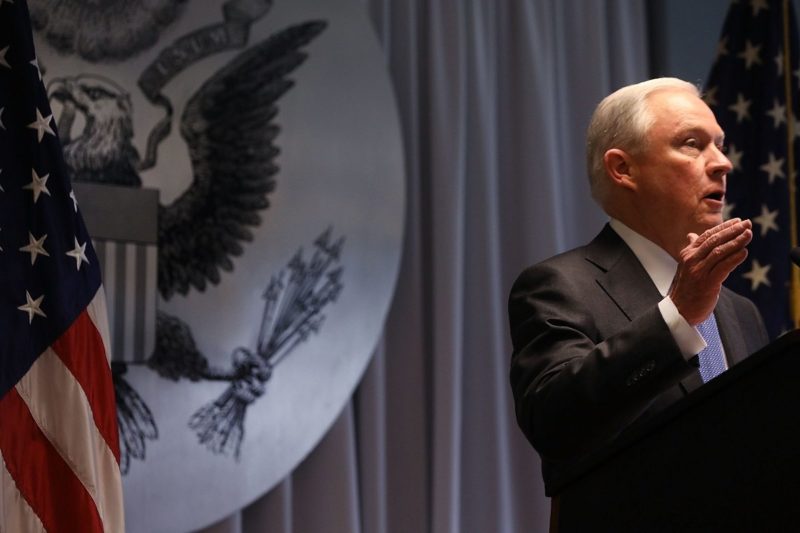Of Course the Trump Administration Will Abandon the Birth Control Benefit
Reports have surfaced that conservatives are worried the Trump administration won't abandon the birth control benefit. That's absurd.

Last week, the Washington Post, along with other media outlets, reported that conservatives are concerned the Trump administration will continue to defend the Affordable Care Act’s birth control benefit in ongoing litigation.
But there is no way a Department of Health and Human Services (HHS) led by Secretary Tom Price and a Department of Justice (DOJ) led by Attorney General Jeff Sessions III will have any intention of directly or indirectly defending the benefit. The Trump administration is shaping up to be nothing but regressively anti-contraception, and to suggest otherwise is ludicrous.
Let’s begin first with the agencies involved in this fight, and the individuals holding the key positions at those agencies.
The HHS is in charge of enforcing the administrative rules that support and enforce the birth control benefit. Its secretary, Tom Price, thinks there is “not a single woman” who can’t afford birth control. He’s openly anti-choice and has actively worked to defund Planned Parenthood.
Then there is Charmaine Yoest, who was just recently installed as the HHS assistant secretary for public affairs. She’ll report directly to Price and act as his “principal counsel on public affairs—providing executive leadership, policy direction, and management strategy” according to a statement from the administration. In other words, a hardline anti-choice activist who wants to make abortion illegal again will help set the agency’s priorities in the immediate and in the long term.
Meanwhile, Politico reports that Teresa Manning, an outspoken critic of contraception, is expected to be named HHS deputy assistant secretary for population affairs. This would put her in charge of directing the Office of Population Affairs (OPA). OPA administers the Title X National Family Planning Program, which puts Manning in charge of helping to set policy surrounding family planning, contraception, and teen pregnancy, as well as overseeing any funding Republicans in Congress allocates toward Title X facilities.
Finally, Attorney General Sessions has a long record of being anti-birth control (as well as other forms of reproductive health care). He has no intention of defending a law designed to make contraception accessible and affordable.
I promise you that with this leadership, providing any access to contraception—let alone protecting the access that already exists—will not be a priority. Absolutely the opposite, in fact: These appointments suggest this administration plans to attack it, full stop.
But at the moment, it has a logistics problem. The HHS would need to unwind the benefit via administrative rule making, a process that takes months at a minimum. Meanwhile, Congress can’t seem to find the votes—despite controlling both the House of Representatives and the Senate—to pass a repeal of the Affordable Care Act. Until either of those two things happens, it is very difficult, if not impossible, for the Trump administration to come up with a sufficient excuse as to why it no longer will defend its own federal law.
Last year, the U.S. Supreme Court punted on a decision in Little Sisters of the Poor v. Burwell. That case sought to expand the exemption churches and other houses of worship have from complying with the birth control benefit to any religiously affiliated organization who asked for one, including those that provided services to people of all sorts of faiths. Instead of directly resolving the question of whether these groups could be exempt from the benefit, the Roberts Court sent the litigation back to the appellate circuits and told the parties to work it out. That hasn’t happened.
And it doesn’t solve the issue Sessions’ DOJ has, which is what to do about all the cases like Little Sisters still sitting out there in at least three federal courts of appeals. The Department of Justice is still the federal government, and up until January, the federal government both believed in and defended nondiscriminatory access to health care. Sessions has to explain the change of position to the courts because the DOJ remains a party to litigation and has been defending the benefit for years now. And at this point, the DOJ evidently doesn’t quite know how to do that.
So far, the DOJ’s immediate answer to both institutional rule-making inertia and congressional incompetency has been to ask the courts for more time, seeking delays in all of the litigation on the grounds it is installing new personnel during the transition between administrations. This is a pretty routine request, which the courts generally grant with some leniency. They’ve done so in this case too.
This request, though, is not at all a signal the administration plans to continue to defend the birth control benefit. It’s simply a delay to see if Congress can repeal the ACA or if Price and his agency can get something through the rule-making process. In the meantime, it’s likely that the agencies in charge of enforcing the birth control benefit will just cease to do so.
So why would conservatives fret that somehow an administration that is clearly hostile to any access to contraception would somehow defend part of a law Trump also vowed to repeal?
Who knows. Maybe it is to increase the pressure on the administration to finally drop the religious imposition executive order Trump has hinted he intends to issue at some point. Maybe it is to try and help moderate the public perception of an administration packed full of anti-choice radicals.
But let’s be very clear here. There is no de-escalation in the war against contraception access. There is no continuation of Obama-era nondiscrimination in health care policies. Conservatives can fret to the media all they want about whether or not the Trump administration is anti-contraceptive enough, but the truth is the administration couldn’t be more anti-contraception. And I think it’s safe to say conservatives know this too.

